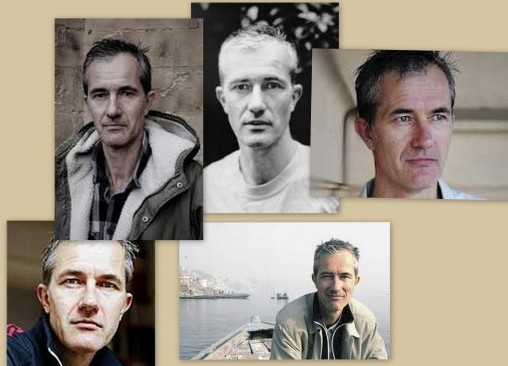Part of the genius of Zona is Dyer’s skill at taking art and turning it on himself and his reader to reveal the exquisite longing of the heart. Dyer does what all great writers do: he makes you interested in his subject matter, he makes you excited to learn more. — Jason DeYoung
Geoff Dyer
Zona
Pantheon, 2012
$24.00, 228 pages
Geoff Dyer is a British-born essayist and novelist. While he has written a number of smart novels—probably his best being Jeff in Venice, Death in Varanasi—his nonfiction (written mostly as book-length essays) is thought of as especially original and brilliant. Dyer’s broad intelligence and charm make the work addictive. He has a gift for putting oddly diverse cultural touchstones—Hakim Bey to Wordsworth, Thievery Corporation to Miguel De Unamuno—together with his own offbeat insights to create keys to contemporary culture (and personal understanding).
In a recent Bookforum interview Dyer was asked if was fair to say that his work is written in part “against clichés of genre, clichés of convention.” Here’s what he said:
Oh, indeed. Absolutely. That’s one of the reasons why I’ve drifted away from fiction as a reader as well as a writer…[S]ome novels can actually be conceived at the level of cliché. The whole idea of what we want from a novel sometimes is for it to conform to a very familiar set of conventions.
Dyer’s nonfiction often falls within two categories. While he has written books on serious subjects such as The Missing of the Somme (about World War I) and the Ongoing Moment (about documentary photography), he also has a cannon of playful and irreverent books such as Yoga for People Who Can’t Be Bothered to Do It (a collection of travel writings) and Out of Sheer Rage (a quasi-memoir devoted to Dyer’s own desire to write a “sober academic study” of D. H. Lawrence —he never does; he just writes one about wanting to write one).
Zona—a book devoted to writing a gloss on Stalker, a ’70 Russian art-house film—seems to belong somewhere in that whimsical column. With his trademark wit and whine, Dyer humorously summarizes the rather humorless Stalker, lovingly interpreting it through a combination of autobiography, literary theory, and cultural criticism, opening up a rather difficult film so that even non-cinéastes can find pleasure and meaning in it.
Stalker, released in 1979, is Andrei Tarkovsky’s sixth full-length movie, and it’s loosely based on Roadside Picnic, a science fiction novel written by Arkady and Boris Strugatsky. As the opening caption of Stalker sets things up: something has happened—a meteorite crash or alien visitation(?)—which has led to the creation of the Zone, a place “troops where sent in and never returned.” The boundaries of the Zone are now outlined with barbed wire and cinderblock walls and militarized. The movie depicts an illegal expedition lead by the eponymous Stalker who guides two characters simply known as Writer and Professor into the Zone.
Somewhere within the Zone there is a room that that will fulfill your most deeply held wish. The Writer and the Professor want to go to this room. The Professor and Writer both want something like greatness. Writer, in particular, wants inspiration, and Dyer can’t help but identify with him:
[Writer] is washed up. Finished. Maybe by going to the Zone he’ll be rejuvenated. Man, I know how he feels. I could do with a piece of that action myself. I mean, do you think I would be spending my time summarizing the action of a film almost devoid of action—not frame by frame, perhaps, but certainly take by take—if I was capable of writing anything else? In my way I’m going to the Room—following these three to the Room—to save myself
Reading Zona is not unlike being with a friend who talks excitedly over movies. The actual pages are often halved with the top half occupied by Dyer’s “take by take” summary and with the bottom occupied with an abundance of footnotes—which cannot be dismissed and have equal prominence. In Zona, Dyer keeps hitting the metaphorical pause button to tell about his childhood, the movie, his insights into it, its history, Tarkovsky himself, or share bits of cinematic-lore, such as how Mick Jagger remarked that Godard was such a “fucking twat,” speaking of the experience with the filmmaker on the documentary Sympathy for the Devil. It’s all very noteworthy and compelling. As Dyer writes: “In a sense this book is a catalogue or compendium of proposals for potentially interesting studies.”
After a journey through a landscape that is “completely weird and completely ordinary,” the three characters arrive at the Room’s door. At the entrance, Stalker tells Writer and Professor to think back over their entire life. Writer seems to be the one who’ll enter first. But he stops. He cannot go. Why? Donno. Even Tarkovsky confesses in a 1980 interview that he didn’t know why*. In fact, neither Writer nor Professor can enter the room. (Note: I’m not spoiling the movie here.)
For Tarkovsky the existence of the Room “serves solely as pretext to revealing the personalities of the three protagonists.” And as a person who is following these three characters in the movie, Dyer stands at the door, too. Unable to make a decision whether to enter, Dyer meditates on desire, faith and belief: “Is one’s deepest desire always the same as one’s greatest regret?” Is this why Writer and Professor cannot enter the Room, since they will have to face their true selves? As Tarkovsky puts it: the Room fulfills “a hidden vision lying deep within the heart of each person” because they don’t ask the Room for what they want, the Room will just know. At the Room’s threshold, Dyer bares his own desires and begins to question their validity.
There is such sincerity and allure in Dyer’s prose that the reader ends up following him to the Room as well, and his interpretation of the film leaves a lasting impact. As the author questions his wants, you can’t help but to question the faith you have in your own desires, and if obtaining them will make you happy. And this is part of the genius of Zona, Dyer’s skill at taking art and turning it on himself and his reader to reveal the exquisite longing of the heart.
Dyer does what all great writers do: he makes you interested in his subject matter, he makes you excited to learn more. Tarkovsky is a difficult filmmaker—in pacing and in image—and his films demand thoughtful viewing and patience, something that’s becoming increasingly more difficult—even for Dyer—because of our diminishing attention span. But he laments, “a lot of what’s being shown on the world’s screens—television, cinemas, computers—is fit only for morons.” I cannot say whether it’s a good idea to see Stalker first or read Zona first. I saw the movie before reading Zona, and it helped me to hold the thread of Dyer’s synopsis while reading the footnotes. But I wonder what it would be like to experience the book without knowing the movie, experiencing Zona as “book” instead of something like companion piece, because there’s something so dreamy in how Dyer describes his personal vision and experience of watching Stalker, and entering his Zone, a “place of refuge and sanctuary. A sanctuary…from cliché.”
— Review by Jason DeYoung
——————————–
Jason DeYoung lives in Atlanta, Georgia. His work has recently appeared in Corium, The Los Angeles Review, The Fiddleback, New Orleans Review, and Numéro Cinq.
*All quotations by Andre Tarkovsky come from Andre Tarkovsky: Interviews, ed. by John Gianvito, University Press of Mississippi, 2006.


